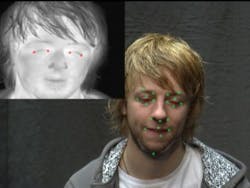Facial image analysis helps spot liars
A UK academic is developing a noninvasive lie detection system based on the analysis of facial images.
Professor Hassan Ugail from the University of Bradford (Bradford, UK) says that the system could prove complementary to polygraph-based lie detection systems, which measure skin conductivity and blood pressure.
In Ugail's system, a subject’s face is recorded by both a video camera and a £60,000 thermal infrared (IR) camera. To establish a baseline condition for the face, the video camera compares the subject’s facial expressions under questioning with their appearance during a series of harmless questions that they answer truthfully.
The IR camera, on the other hand, detects temperature changes of as little as 0.1 degrees, especially in the skin around the eyes. Because lying involves increased brain activity, blood flow in the face is a key indicator of dishonesty.
The combination of the two imaging techniques should allow lying to be detected with 90% accuracy -- results comparable to the polygraph. However, Ugail stresses that even this technology cannot reveal whether the answer to a specific question is untrue. He believes it is more likely to become a decision aid than an absolute indicator of honesty. Nevertheless, the system may have applications beyond law enforcement. It could be used to spot the early stages of dementia or used by those in marketing to gauge customer responses to new products.
The £500,000 (US$800,000) project has been supported by the Engineering and Physical Sciences Research Council (Swindon, UK) in collaboration with the UK Home Office (London, UK), the UK Border Agency, and Qinetiq (Farnborough, UK).
-- Posted by Vision Systems Design
